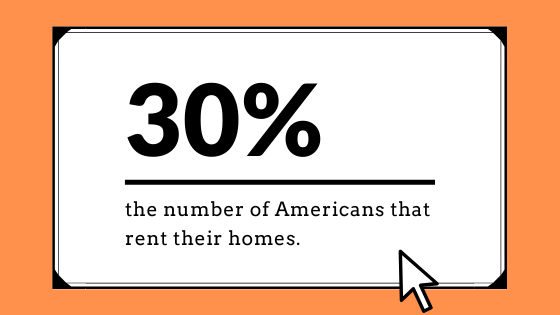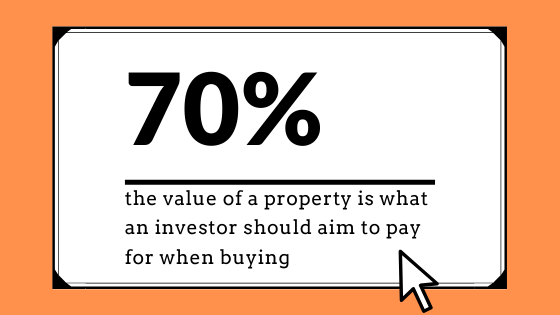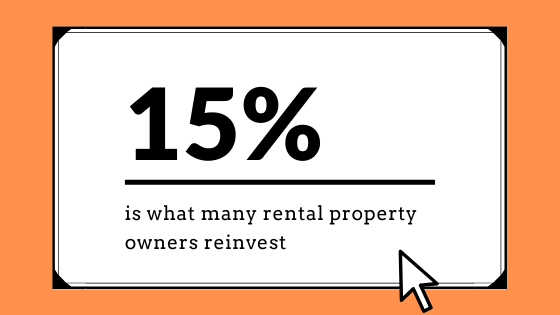More individuals are seeking avenues of earning additional income as the average cost of living rises across the country. The majority of these individuals are parallel entrepreneurs; working full-time in one field but looking to earn money through an additional stream of passive income. There are many benefits to real estate passive income as an investment strategy where earnings can be made with little active involvement needed from the investor.
Real estate ownership is one of the most common passive income strategies, used by many to increase cash flow or provide security for their retirement. If you’re still exploring ways to make passive income, this guide will show you how to earn passive income from real estate investing in 2020.
What is Passive Income?
Passive income is a loose term, referring to various investment strategies that all require different levels of personal involvement from the investor to make returns. The IRS considers passive income to be income from a source other than an employer or contractor. The most popular example of a reliable passive income strategy by far is owning rental properties.
Is real estate investing a good passive income source?

Nearly 30% of all Americans rent their homes, and there were 43 million housing units occupied by renters in the United States over the past two years. There is no shortage of need for rental housing, and this will be true for the expected future. In other words, if you select the right property and manage the costs correctly, a investing in real estate can deliver excellent returns for years and even decades to come.
A Real estate passive income strategy is treated more like a business, in which the owner takes a more active role in the management and financial outcome of the investment. Rentals can vary between long-term, or short-term such as monthly, weekly or even nightly depending on the investor’s preferences and will have different rental prices and profits.
The rental income covers the property owner’s expenses and creates an influx of cash flow. Earning a steady monthly rental income provides an assured, direct income stream for the investor which offsets all expenses with a margin of profit. In addition to that, the property owner can benefit from increasing property value over time if they select a property in a sought-after area with lots of amenities. It’s always good to think about the longevity of your real estate investment should you ever want to sell it in the future.
While more reliable, this method does not guarantee profitability and losses can still occur.
The Key to Earning Passive Income with Rental Properties
To make money with rental properties you need to have a concrete plan and a well-thought-out business strategy. This strategy should ultimately include aspects such as researching the target market and being aware of the local real estate values and trends. These are the factors that really dictate whether a property investment will be successful or not.
Recent home sales in the area will be largely indicative of the performance of the neighborhood with buyers and guide you when setting a price. For the real estate investor, gathering general information from the local real estate market will help to identify listings that have good cash flow potential as well as helping you choose the best property to hold for passive income purposes.
As a prospective landlord, you will also need to set up a plan for how tenants, finances, paperwork and other, finer details will be managed. If you plan to manage the property yourself, you may want to start with the simplest type of property; a single-family home or condo rented to a single tenant. The landlord acts as the tenant’s first contact point, and they will contact you with any queries or issues with the expectation that they be resolved quickly and non-intrusively. This is an easier task when there are less tenants and units to manage in general.
How To Select A Rental Property
If you’re new to owning rental properties, you should aim for a home that is modest and not too expensive or too cheap. A property that falls on the higher end of the price range might not sell as fast due to the issue of buyer affordability, while a property that is suspiciously inexpensive may have significant problems lurking below the floorboards or behind the walls that will need to be repaired prior to bringing in tenants. It is also essential to never go into debt to purchase a property, particularly for the purpose of earning passive income, so always buy only what you can realistically afford.

The general guideline for new investors is to purchase a property at around 70% of what it is worth in relation to other properties in the area that are currently on the market. You should also note that properties located in areas with good schools will appreciate in value better then properties with not so good school options. As an investor, you should ideally look for a property in a stable or up-and-coming neighborhood with promising developments, where prices will increase consistently over the next few years.
When choosing a rental property to purchase, it’s wise to look for off-the-market deals for optimal results. Foreclosures are a great source of leads for good property deals if you want to renovate and resell or hold, and these off-the-market properties can yield great returns with less competing offers to contend with. Bank auctions are another great place to pick up discounted properties. These auctions are organized by banks when a distressed seller forfeits on their loan, typically due to debt, allowing the bank to auction the collateral to recoup the funds.
New investors should avoid more serious fixer-uppers when looking for a rental property through these sources – these properties can quickly become money pits to investors who do not know where to spend their funds effectively. Turnkey properties are the best starter option. Turnkeys are homes that are ready to move into and do not require prior renovation.
Tips For Managing A Rental Property
If you won’t be managing the property yourself, a dedicated property manager is the ideal solution. A professional property manager can screen tenants, collect rent and deal with complaints and other matters like general maintenance and even evictions. The property manager will take a commission as payment, but it can be worth it to ensure less active involvement needed on your part.This manager can also help you set the rental price for your property, and will have experience setting prices in your property’s neighborhood.
The monthly fee charged for your property should be enough to adequately cover all the landlord’s expenses, including a property manager’s fee, and still have some left over as profit. These monthly expenses will often include general maintenance expenses like landscaping or gardening services, HomeOwner Association fees, home insurance, and other costs. Choosing the right property manager is essential for the success of your real estate investment. This is where research and due diligence comes in – determining if any licenses are needed, whether they have insurance, their track record and other factors need to be ascertained before any contracts are signed.
However, many rental investors choose self-management instead, especially if they are personally located close-by to their investment property. In this case it is the landlord’s duty to take on all of the aspects a property manager would handle. Even with the input of a property manager, the landlord has a responsibility to check in with tenants every few months to see if they have any personal grievances or feedback.
The Finer Details Of Owning A Rental Property
There are some finer financial details you will need to be aware of as a new landlord. Apart from ideally being debt-free before purchasing any property, it’s also important to have an emergency fund in place which can cover a few months’ worth of expenses in case of non-payment of rent or other situations. As a landlord, this emergency fund is also essential as it will cover unpredictable situations like larger repairs in case of burst pipes or other unexpected damage.
Another important financial factor to consider when purchasing a rental property is taxes. Rental income is typically taxed as ordinary income but there are also tax benefits to be gained from earning passive income. Rental property owners can lower their tax burdens in several ways; deductions can be made for maintenance costs, insurance costs and other fees related to rental ownership.

But other than earning passive income, how should that return be reinvested? Many rental property owners invest around 15% of the income earned into 401(k)s or IRAs or into another asset type to maximize returns and diversify their options.
Can Real Estate Investment Trusts (REITs) Generate Passive Income?
Owning rental properties is not the only way to make money passively from real estate investing. Real estate investment trusts (REITs) are another real estate-based investment, in which publicly or privately traded companies pool investors’ money and use it to manage real estate properties, usually commercial in nature.
REITs typically pay 90% of their earned income from real estate back to their shareholders in exchange for larger tax benefits. The dividends earned by investors on REITs are a noteworthy passive income strategy, as they have been found to earn higher returns on average compared to stocks and other tradable assets.
REITs are a good starting point for newer investors who want to earn passive income as they have lower upfront costs, provide higher returns on average than stocks and can be bought easily using a brokerage account. Profitability is dictated by both the company and how they select real estate projects to invest into. This method takes a lot of stress away from the process of finding, buying and managing your own property. It is also relatively easy to buy REITs through a local or international stock market.
What Is Real Estate Crowdfunding?
Crowdfunding real estate is an exciting opportunity for passive income investment. Currently available to accredited investors, crowdfunding participants can earn income from real estate passively by pooling their funds with other investors to sponsor third-party real estate transactions. Returns on real estate crowdfunding will vary based on the type of property investment and how the crowdfunding payout is structured. Some crowdfunding projects will pay monthly returns, others pay quarterly, while some provide future profits from the final sale of a property.
Real estate crowdfunding is a newer field; returns are not guaranteed and some investments will fail. But this strategy is ideal for investors wanting to test the waters by starting with smaller investment amounts. This strategy is also intriguing for foreign investors, – particularly those wanting exposure to local real estate markets.
Final Thoughts on Earning Passive Income From Real Estate Investing
Real estate investing is a reliable way to earn passive income, build wealth, and generate positive cash flow. From personally owning a single-tenant rental property to investing in REITs or real estate crowdfunding, there are many opportunities for earning passive income in the modern age. REITs and real estate crowdfunding in particular are lowering the barriers to entry for investors wanting to get involved in real estate.
If you want a stable wealth-building method, passive income real estate investing is the way to go.
Apart from the added benefit of direct income, passive income through rental real estate loosens up the investor’s time and financial constraints. For some, passive income allows them to pursue other passions completely and travel without the need for additional full-time work. Successfully earning passive income may take some time, but it’s worth it to achieve the freedom to pursue what really drives you.
Keen To Learn More?
To learn more about how to invest in real estate, make sure download your free copy of Achieving Wealth Through Real Estate: A Definitive Guide To Controlling Your Own Financial Destiny Through a Successful Real Estate Business here: https://newsilver.com/free-ebook-achieving-wealth-through-real-estate/




